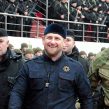
Like Russia, Chechnya Is Being Increasingly Drawn Into Syrian Conflict
Publication: Eurasia Daily Monitor Volume: 12 Issue: 182
By:

Russia officially declared its intentions to intervene in the Syrian civil war only in September, but Moscow has been backing President Bashar al-Assad’s regime since the start of the conflict. Perhaps the most interesting part of Russia’s campaign in Syria is the current question of how far Moscow is prepared to go in its joint land operations with Iran and al-Assad. For example, is Russia planning to dispatch additional ground forces made up of specially trained Chechens to Syria?
Nearly all of Russia’s governors have expressed support for the Kremlin’s actions in Syria. Chechnya’s governor, Ramzan Kadyrov, stated that he fully supported the decision by the Russian leadership to use force in Syria to fight the Islamic State terrorist group. “I fully support the decision of the President of the Russian Federation, Vladimir Putin, about using the Russian the armed forces to fight terrorists in Syria,” Kadyrov posted on Instagram (Instagram.com, September 30). Kadyrov said Russia’s involvement in Syria would prevent the Islamic State from descending on Russian cities and villages. Once again, the governor of Chechnya offered his services to Putin.
While waiting to see whether Chechen special forces would be sent to Syria, Kadyrov held military exercises to show the military preparedness of his forces. On September 30, he looked in on his “Flying Squad” special forces unit, with his aide on cooperation with law enforcement agencies, Daniil Martynov, saying that “just in the past two weeks, the troops have made over forty parachute jumps. The troops acquired the experience of landing on mountain slopes, in the forest, and in deep snow. All officers have acquired the skills of carrying out special operations under a variety of conditions” (Lifenews.ru, September 30).
Two days later, on October 2, large-scale counterterrorist exercises were conducted in the village of Chervlyonnaya, in Chechnya’s Shelkovskoi district, with the participation of the regional police and the security services (Kavkazsky Uzel, October 2). In September, the Southern and the North Caucasian Federal Districts jointly held large-scale command post and special tactical exercises in Chechnya for the first time. Media coverage primarily focused on the counterterrorist part of the exercises (Chechnyatoday.com, September 17). The head of the Russian Ministry of Interior’s Support Division for the Activities of Special Forces and Aviation, Major-General Ivan Birnik, expressed high regard for the preparedness of the Chechen special forces. Birnik’s mission was to assess the ability of the Chechen forces to operate in Chechnya and the North Caucasus, as well as in a larger context inside Russia. It appears that the Russian officials were satisfied with what they saw in Chechnya and appreciated Kadyrov’s efforts to create special services units that are on a par with some of the best such units in the Russian armed forces.
Kadyrov has indicated that the Chechen special services carry out more operations than those officially reported. Chechnya’s governor said his government works outside Chechnya to identify terrorists and Islamic State recruiters. “We send people to fetch them from Syria. We return those who have not reached their destination and did not participate [in military action],” Kadyrov said (Rusnovosti.ru, October 2).
Although Kadyrov only mentioned his government’s efforts to return young Chechens from Syria, he may be using the same channels to find out about the Chechens who are fighting in the Middle East in the ranks of various groups of militants. According to Chechnya’s interior ministry, between 2013 and the summer of 2015, 405 individuals left the republic for Syria, at least 104 of whom were killed and 44 returned home (Kavkazsky Uzel, October 3).
Those are only the people the police and the Federal Security Service (FSB) have identified as participants in the conflict in Syria. In reality, the number of Chechens who went to Syria to fight is far larger because the security services have a hard time determining the whereabouts of everyone who has left Chechnya. All Chechens who fly from the North Caucasus to Istanbul come under suspicion automatically because Turkey is the transit point for many Muslims who want to join the militants in the Middle East. The Islamic State is one of the most popular groups among the Chechen recruits because a widely known Chechen, Umar Shishani (Tarkhan Batirashvili), plays an important role in the organization. The Caucasus Emirate of the Middle East is the second most attractive group to the Chechen recruits. This Middle Eastern branch of the Caucasus Emirate has been set up by another Chechen, Salahudin (Faizulla Margoshvili). The third most popular group of militants is Junud al-Sham, which is led by another Chechen, Amir Muslim (Muslim Margoshvili). Junud al-Sham is especially appealing to Chechen recruits from Europe. The fourth-most popular group, Ajnad Kavkaz, is also rapidly growing. It is under the command of another famous Chechen in Syria, Amir Abdul-Khakim (Rustam Azhiev).
Since the official start of Russia’s military involvement in Syria to back President al-Assad’s embattled Alawite-dominated regime, Ramzan Kadyrov has stated almost daily that his forces should be sent to the Middle East. However, if Kadyrov’s forces turn up in Syria, Chechnya’s governor will collide with all the Sunni Muslim leaders in the Middle East who have maintained friendly relations with him. By siding with the Alawites, Russia is essentially challenging the Sunnis, including Russia’s Muslims, 99.99 percent of whom are Sunni. The conflict in Syria, therefore, could have a great impact on the North Caucasus and Russian Muslims in general, and in ways that are completely unpredictable.




